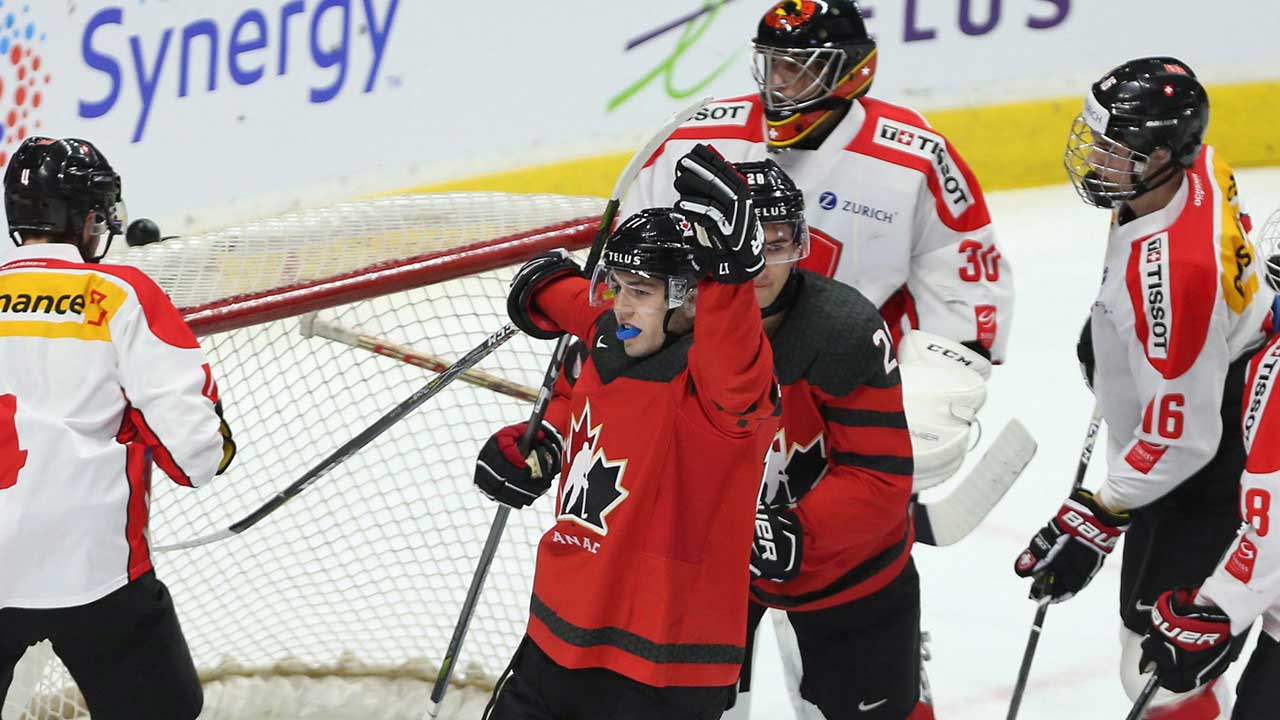If you were otherwise preoccupied over the closing weekend of the holidays, you may have missed one of the most brutally honest press conferences a hockey coach has ever delivered.
It happened in Buffalo, where Canada and Switzerland will face off Tuesday in the quarter-finals of the world junior hockey championship.
Some history: Canada wrapped up the preliminary round atop Pool A, outscoring its opponents 21-6. Switzerland finished fourth in Pool B, getting outscored 20-10 and earning the right to play Canada only by virtue of its razor-thin 3-2 victory over Belarus.
Canada and Switzerland have played 21 times prior at this tournament; Canada has won all 21 games. Canada and Switzerland played an exhibition game a few weeks ago ahead of the preliminaries; Canada won, 8-1, outshooting the Swiss, 61-7.
So, tall order for Switzerland. And their head coach, the colourful Christian Wohlwend, a Canadian himself who has been coaching in Switzerland since 2007, agrees. Asked what kind of game he was expecting against the Canadians Tuesday, he was nothing if not direct.
“A Canada team who dominates us again,” Wohlwend said. “They’re faster, they’re bigger, they’re stronger, they can shoot better, they can pass better, they can do everything better.
“How many first-rounders do they have?” Wohlwend continued, before a reporter replied that Canada has seven. “And the rest in the second round? And one in the fourth round (Montreal Canadiens defenceman Victor Mete) who has played the most NHL games so far? So, what am I going to tell the guys?
“We have one in the fourth round, too. One. And the rest are not drafted.”

This is certainly a unique strategy in the realm of pre-game coach comments. But there’s also some ingenuity to it. While Switzerland will need a miraculous performance to upend the Canadians, Wohlwend has at least relieved any stress his players may have been feeling ahead of the quarter-final clash.
The expectations couldn’t be any lower. Even keeping the game close is now a triumph. Just learning something from the expected thrashing will be constructive.
“Pressure? I don’t know that word, pressure,” Wohlwend said. “We don’t have pressure at all.
“We are the youngest team in the whole tournament. That’s the positive thing. We can learn from it. … It’s just nice to have this experience for all the players for the future.”
Wohlwend may also be trying to play into the over-confidence of the Canadians, and encouraging them to look ahead to who they may draw in the semifinals. If your opponent is saying they don’t have a chance, maybe you play a little less forcefully and leave yourself open to an unlikely upset.
“I didn’t know what to think at the start. I watched it a couple times laughing a little bit,” Canadian captain Dillon Dube said of Wohlwend’s analysis. “I think that might’ve been a little reverse psychology.
“I think that was part of it — over-confidence. Because he was saying that we dominated them in the exhibition. And they’re going to come out trying to catch us sleeping. So, that’s why we’ve really got to focus on our game.”
Wohlwend also makes a necessary point about the realities of a tournament like this, and the extreme drop-off in resources from hockey’s big fish like Canada, the United States, Russia, Finland, and Sweden, to the tournament minnows like the Swiss, Belarus, and Denmark.
For instance, when the Canadians played the Danes in their final preliminary game, they were facing a country that has less registered junior hockey players than Canada has indoor rinks.
As Wohlwend says, teams like his come into this tournament understanding they’ll likely only play a game or two that they have any chance of winning.
Since 1977, Canada and Russia have won more than half of the medals awarded (65 of 123), and 29 of 41 golds. Finland, the US, and Sweden account for almost all of the rest. Czech Republic has 14 medals, Slovakia has two, and Switzerland has one, a bronze won in 1998.
| Gold | Silver | Bronze | Total | |
|---|---|---|---|---|
| Canada | 16 | 9 | 5 | 30 |
| Russia | 13 | 12 | 10 | 35 |
| Finland | 4 | 4 | 6 | 14 |
| USA | 4 | 1 | 5 | 10 |
| Sweden | 2 | 10 | 5 | 17 |
| Czech Republic | 2 | 5 | 7 | 14 |
| Slovakia | 0 | 0 | 2 | 2 |
| Switzerland | 0 | 0 | 1 | 1 |
“For us, it’s always one game,” Wohlwend said. “The last three years, it was Denmark. This year, it’s Belarus. We know that. Next year, maybe when everybody’s one year older and 10 kilos stronger from the under ages, we will be a little more competitive.”
[relatedlinks]









